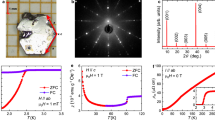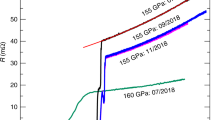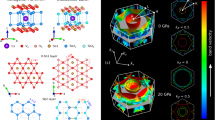Abstract
THE discovery1–3 of superconductivity in C60 doped with the alkali metals potassium and rubidium has introduced a new family of three-dimensional molecular superconductors4. The potassium-doped compound3 K3C60 has a relatively high transition temperature (Tc = 19.3K), a very high upper critical field (Hc2 (T⇒ 0)≈50T) and a short superconducting coherence length5 (£ = 26 Å), in common with the copper oxide superconductors. Here we report muon-spin-relaxation measurements of the magnetic-field penetration depth λ in K3C60. The temperature dependence of λ and of the muon spin relaxation rate indicate that the superconducting energy gap is isotropic, without nodes or zero points. The low-temperature penetration depth λ (T⇒ 0) is about 4,800 Å, which implies a ratio of superconducting carrier density to effective mass to be n2/(m*/me) = 1.2 x 1020 cm-3 if one assumes the 'clean limit'. Combining this result with the value of ε, we estimate the Fermi temperature TF = 470 K. In the relationship between TF and Tc, K3C60 conforms to the trend exhibited by 'exotic' superconductors6,7 such as the Chevrel phase compounds, the copper oxides and the organic BEDT systems.
This is a preview of subscription content, access via your institution
Access options
Subscribe to this journal
Receive 51 print issues and online access
$199.00 per year
only $3.90 per issue
Buy this article
- Purchase on Springer Link
- Instant access to full article PDF
Prices may be subject to local taxes which are calculated during checkout
Similar content being viewed by others
References
Hebard, A. F. et al. Nature 350, 600–601 (1991).
Rosseinsky, M. J. et al. Phys. Rev. Lett. 66, 2830–2832 (1991).
Holczer, K. et al. Science 252, 1154–1157 (1991).
Stephens, P. W. et al. Nature 351, 632–634 (1991).
Holczer, K. et al. Phys. Rev. Lett. 67, 271–274 (1991).
Uemura, Y. J. et al. Phys. Rev. Lett. 62, 2317–2320 (1989).
Uemura, Y. J. et al. Phys. Rev. Lett. 66, 2665–2668 (1991).
Keller, H. IBM J. Res. Dev. 33, 314–322 (1989).
Uemura, Y. J. et al. Physica 164, 857–860 (1989).
Uemura, Y. J. Physica B169, 99–106 (1991).
Sparn, G. et al. Science 252 (in the press).
Pincus, P., Gossard, A. C., Jaccarino, V. & Wernick, J. H. Phys. Lett. 13, 31–33 (1964).
Brandt, E. H. Phys. Rev. B37, 2349–2352 (1988).
Rickayzen, G. Theory of Superconductivity (Wiley, New York, 1965).
Le, L. P. et al. High-Temperature Superconductor-M2S III Conf.; Physica C (in the press).
Pümpin, B. et al. Z. Phys. B72, 175 (1988).
Sternlieb, B. J. et al. Physica C162–164, 679–680 (1989).
Author information
Authors and Affiliations
Rights and permissions
About this article
Cite this article
Uemura, Y., Keren, A., Le, L. et al. Magnetic-field penetration depth in K3C60 measured by muon spin relaxation. Nature 352, 605–607 (1991). https://doi.org/10.1038/352605a0
Received:
Accepted:
Issue Date:
DOI: https://doi.org/10.1038/352605a0
This article is cited by
-
Nodeless superconductivity and its evolution with pressure in the layered dirac semimetal 2M-WS2
npj Quantum Materials (2019)
-
Phase Diagrams and Electromagnetic Propertiesof s–wave Superconductivity of the Extended Hubbard Model with the Attractive Pair–Hopping Interaction
Journal of Superconductivity and Novel Magnetism (2019)
-
Giant microwave absorption in fine powders of superconductors
Scientific Reports (2018)
-
Signatures of the topological s +− superconducting order parameter in the type-II Weyl semimetal T d-MoTe2
Nature Communications (2017)
-
Phonon-induced superconductivity and physical properties in intercalated fullerides Rb3C60
Journal of Theoretical and Applied Physics (2012)
Comments
By submitting a comment you agree to abide by our Terms and Community Guidelines. If you find something abusive or that does not comply with our terms or guidelines please flag it as inappropriate.



